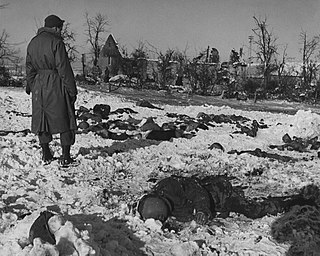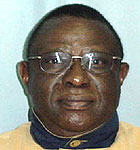
A war crime is a violation of the laws of war that gives rise to individual criminal responsibility for actions by combatants in action, such as intentionally killing civilians or intentionally killing prisoners of war, torture, taking hostages, unnecessarily destroying civilian property, deception by perfidy, wartime sexual violence, pillaging, and for any individual that is part of the command structure who orders any attempt to committing mass killings including genocide or ethnic cleansing, the granting of no quarter despite surrender, the conscription of children in the military and flouting the legal distinctions of proportionality and military necessity.
Universal jurisdiction is a legal principle that allows states or international organizations to prosecute individuals for serious crimes, such as genocide, war crimes, and crimes against humanity, regardless of where the crime was committed and irrespective of the accused's nationality or residence. Rooted in the belief that certain offenses are so heinous that they threaten the international community as a whole, universal jurisdiction holds that such acts are beyond the scope of any single nation's laws. Instead, these crimes are considered to violate norms owed to the global community and fundamental principles of international law, making them prosecutable in any court that invokes this principle.

Crimes against humanity are certain serious crimes committed as part of a large-scale attack against civilians. Unlike war crimes, crimes against humanity can be committed during both peace and war and against a state's own nationals as well as foreign nationals. Together with war crimes, genocide, and the crime of aggression, crimes against humanity are one of the core crimes of international criminal law and, like other crimes against international law, have no temporal or jurisdictional limitations on prosecution.

The Nuremberg principles are a set of guidelines for determining what constitutes a war crime. The document was created by the International Law Commission of the United Nations to codify the legal principles underlying the Nuremberg Trials of Nazi party members following World War II.
An ex post facto law is a law that retroactively changes the legal consequences or status of actions that were committed, or relationships that existed, before the enactment of the law. In criminal law, it may criminalize actions that were legal when committed; it may aggravate a crime by bringing it into a more severe category than it was in when it was committed; it may change the punishment prescribed for a crime, as by adding new penalties or extending sentences; it may extend the statute of limitations; or it may alter the rules of evidence in order to make conviction for a crime likelier than it would have been when the deed was committed.

Jeremy Dean Hinzman is an Iraq War resister who was the first American deserter to seek refugee status in Canada.

The Immigration and Refugee Board of Canada, established in 1989 by an Act of Parliament, is an independent administrative tribunal that is responsible for making decisions on immigration and refugee matters. As one of their responsibilities, the IRB decides on applications for refugee protection made by individuals. The IRB reports to Parliament through the Minister of Immigration, Refugees and Citizenship (IRCC), but remains independent from both the IRCC and the Minister.

Théoneste Bagosora was a Rwandan military officer. He was chiefly known for his key role in the 1994 Rwandan genocide for which he was sentenced to life imprisonment by the International Criminal Tribunal for Rwanda (ICTR). In 2011, the sentence was reduced to 35 years' imprisonment on appeal. He was due to be imprisoned until he was 89. According to René Lemarchand, Bagosora was "the chief organizer of the killings". On 25 September 2021, he died in a prison hospital in Mali, where he was being treated for heart issues.

Srđa Trifković is a Serbian-American publicist, politician and historian. He is currently a foreign affairs editor for the paleoconservative magazine Chronicles, and a politics professor at the University of Banja Luka in Bosnia and Herzegovina.
Léon Mugesera is a convicted genocidaire from Rwanda who took residence in Quebec, Canada. He was deported from Canada for an inflammatory anti-Tutsi speech which his critics allege was a precursor to the 1994 Rwandan genocide. In 2016, he was convicted of incitement to genocide and sentenced to life in prison.

The Illegal Immigration Reform and Immigrant Responsibility Act of 1996, enacted as division C of the Omnibus Consolidated Appropriations Act of 1997, made major changes to the Immigration and Nationality Act (INA). IIRAIRA's changes became effective on April 1, 1997.

In Canada, a security certificate is a legal mechanism by which the Canadian government can detain and deport permanent residents and all other non-citizens living in Canada.

The Immigration and Refugee Protection Act (IRPA) is an Act of the Parliament of Canada, administered by Immigration, Refugees and Citizenship Canada (IRCC) and Canada Border Services Agency (CBSA), that replaced the Immigration Act, 1976 in 2002 as the primary federal legislation regulating immigration to Canada. The "Immigration and Refugee Protection Regulations" (IRPR) specify how provisions of IRPA are to be applied.
Incitement to ethnic or racial hatred is a crime under the laws of several countries.

International criminal law (ICL) is a body of public international law designed to prohibit certain categories of conduct commonly viewed as serious atrocities and to make perpetrators of such conduct criminally accountable for their perpetration. The core crimes under international law are genocide, war crimes, crimes against humanity, and the crime of aggression.
Augustin Ndindiliyimana is a former Rwandan General and Chief of the Rwandan National Gendarmerie. He was convicted of genocide by the International Criminal Tribunal for Rwanda but he was acquitted by the tribunal upon appeal.

Canadian immigration and refugee law concerns the area of law related to the admission of foreign nationals into Canada, their rights and responsibilities once admitted, and the conditions of their removal. The primary law on these matters is in the Immigration and Refugee Protection Act, whose goals include economic growth, family reunification, and compliance with humanitarian treaties.

Between 1941 and 1945, the government of Nazi Germany perpetrated the Holocaust: a large-scale industrialised genocide in which approximately six million Jews were systematically murdered throughout German-occupied Europe. Since World War II, several countries have criminalised Holocaust denial—the assertion by antisemites that the genocide was fabricated or has been exaggerated. Currently, 17 European countries, along with Israel and Canada, have laws in place that cover Holocaust denial as a punishable offence. Many countries also have broader laws that criminalise genocide denial as a whole, including that of the Holocaust. Among the countries that have banned Holocaust denial, Austria, the Czech Republic, France, Germany, Hungary, Israel, Poland, Romania, Russia and Ukraine have also banned Nazi symbols. Additionally, any expression of genocide justification is also a criminal offence in several countries, as is any attempt to portray Nazism in a positive light.
The proper handling of war criminals in Canada with regard to criminal prosecution or extradition has been the subject of ongoing debate.
Deepan Budlakoti is an Ottawa-born man best known for Canada's refusal to acknowledge him as a citizen. His case, supported by numerous human rights organizations and a modest mobilization of public support, was heard by several Canadian courts, and has captured domestic and international attention. Since Budlakoti does not hold any citizenship, his case raises questions of citizenship, statelessness and deportation.









